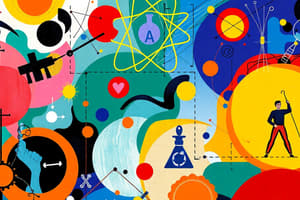Podcast
Questions and Answers
What role does peer review play in scientific communication?
What role does peer review play in scientific communication?
- It ensures the ethical treatment of research subjects.
- It verifies the quality and reliability of scientific research. (correct)
- It allows scientists to share their findings with the public.
- It provides a platform for public presentations.
Which of the following best describes the nature of scientific understanding?
Which of the following best describes the nature of scientific understanding?
- It is permanent and rarely evolves over time.
- It relies solely on anecdotal evidence and individual experiences.
- It is dynamic, tentative, and subject to revision with new data. (correct)
- It is determined by public opinion and belief systems.
What ethical considerations are necessary in scientific research?
What ethical considerations are necessary in scientific research?
- The necessity of collaborations between scientists.
- Environmental impacts, human subjects' rights, and animal welfare. (correct)
- Risks of financial gain overriding research integrity.
- Only the effectiveness of research outcomes.
What aspect of science emphasizes the use of evidence and skepticism?
What aspect of science emphasizes the use of evidence and skepticism?
In what way is scientific communication crucial for progress?
In what way is scientific communication crucial for progress?
Which statement accurately differentiates between scientific laws and theories?
Which statement accurately differentiates between scientific laws and theories?
What is the primary purpose of the scientific method?
What is the primary purpose of the scientific method?
Which branch of science is primarily concerned with the study of living organisms?
Which branch of science is primarily concerned with the study of living organisms?
Why is empirical evidence important in science?
Why is empirical evidence important in science?
What characterizes a scientific theory?
What characterizes a scientific theory?
In which aspect does the scientific method emphasize data collection?
In which aspect does the scientific method emphasize data collection?
How are scientific laws typically characterized?
How are scientific laws typically characterized?
What distinguishes physics from chemistry within the physical sciences?
What distinguishes physics from chemistry within the physical sciences?
Flashcards
Scientific Communication
Scientific Communication
Sharing scientific findings through publications, presentations, and collaborations.
Ethical Considerations in Research
Ethical Considerations in Research
Moral principles guiding scientific research, including animal welfare, human rights, environmental impact, and preventing misuse.
Nature of Science
Nature of Science
Dynamic, ever-evolving process based on evidence and critical thinking.
Peer Review
Peer Review
Signup and view all the flashcards
Tentative Scientific Understanding
Tentative Scientific Understanding
Signup and view all the flashcards
Science
Science
Signup and view all the flashcards
Scientific Method
Scientific Method
Signup and view all the flashcards
Hypothesis
Hypothesis
Signup and view all the flashcards
Scientific Theory
Scientific Theory
Signup and view all the flashcards
Scientific Law
Scientific Law
Signup and view all the flashcards
Physical Sciences
Physical Sciences
Signup and view all the flashcards
Observation
Observation
Signup and view all the flashcards
Data Collection
Data Collection
Signup and view all the flashcards
Study Notes
Introduction to Science
- Science is a systematic and organized body of knowledge about the natural world.
- It relies on empirical evidence, observation, and experimentation.
- Science aims to understand how the natural world works, predict future events, and develop technologies.
- Scientific knowledge is constantly evolving and being refined through rigorous testing and analysis.
- Science is a process, not a collection of facts.
Branches of Science
-
Physical sciences investigate non-living matter.
- Physics studies matter, energy, and their interactions.
- Chemistry studies the composition, structure, properties, and reactions of matter.
- Astronomy studies celestial objects and phenomena.
-
Earth sciences focus on the planet Earth and its processes.
- Geology studies the Earth's composition, structure, processes, and history.
- Meteorology studies the atmosphere and its weather patterns.
- Oceanography studies the oceans and their properties.
-
Biological sciences focus on living organisms.
- Biology studies the structure, function, growth, origin, evolution and distribution of life in all its forms.
- Zoology studies animals.
- Botany studies plants.
- Microbiology studies microorganisms (e.g., bacteria, viruses, fungi).
Scientific Method
- The scientific method is a systematic approach to investigating a phenomenon.
- Observation: noticing a pattern or posing a question about the natural world.
- Hypothesis: a testable explanation for an observation.
- Prediction: a statement about what is expected to happen if the hypothesis is correct.
- Experiment: a controlled procedure to test the prediction.
- Data collection: recording and analyzing observations during the experiment. The data needs to be unbiased, and potentially quantitative.
- Conclusion: evaluating whether the data supports or refutes the hypotheses.
Scientific Theories
- A scientific theory is a well-substantiated explanation of some aspect of the natural world, based on a body of facts that have been repeatedly confirmed through observation and experiment.
- Theories are not guesses, they are robust explanations that stand up to scrutiny. The more evidence, the stronger the theory.
Scientific Laws
- A scientific law describes a relationship that is consistently observed to be true in nature.
- Laws describe what happens, while theories try to explain why it happens.
- Laws are concise statements about observable patterns in nature.
Scientific Communication
- Effective communication is vital to scientific progress.
- Scientists share their findings through publications, presentations, and collaborations.
- Peer review is a crucial part of the scientific process, ensuring the quality and reliability of scientific research.
Ethical Considerations in Science
- Research involves ethical considerations.
- Animal welfare
- Human subject rights
- Environmental impacts
- Misuse of scientific knowledge
- Scientists have a responsibility to conduct research ethically.
Nature of Science
- Science is not static but dynamic and ever-evolving.
- Scientific understanding is tentative, and ideas are constantly being revised and refined as new data emerge.
- Science is based on evidence and skepticism, not mere belief or opinion.
- Science is a human endeavor, and scientists use their creativity and critical thinking skills to advance knowledge.
Studying That Suits You
Use AI to generate personalized quizzes and flashcards to suit your learning preferences.




